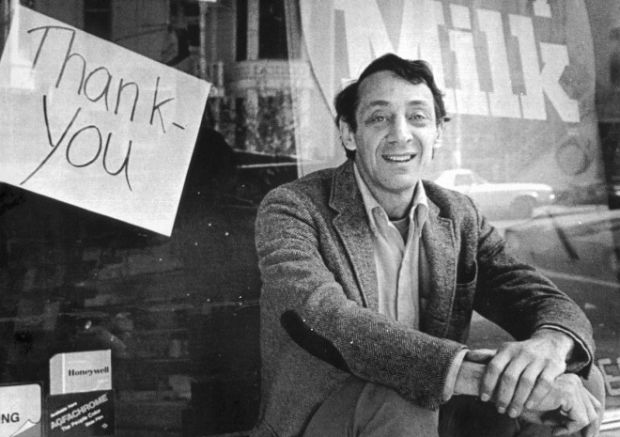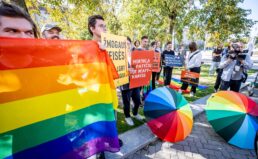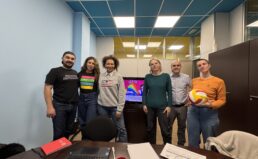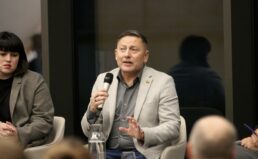Harvey Bernard Milk (1930-1978), a San Francisco city politician with Lithuanian roots, helped open the door for gays and lesbians in the United States by bringing civil rights for homosexuals, among many other issues, to the political table. Since Milk’s murder in 1978, he has remained a symbol of activism.
As a boy. Harvey Bernard Milk was born on May 22, 1930, in Woodmere, New York, but his origins are Lithuanian. His grandfather in fact, was an immigrant and Milk reared in a small middle-class Jewish family. As a child, Harvey was teased for his protruding ears, big nose, and oversized feet, and tended to grab attention as a class clown. He used to play football and sing in the opera at Bay Shore High School and like his older brother, he also used to work at the family department store, Milk’s.
By his early teens, Milk was already aware of his homosexuality, but he chose to keep it to himself. In 1947, he entered the New York State College in Albany and a few years later he graduated in Mathematics. Despite his ability with numbers, he joined the U.S. Navy, serving as a Chief Petty Officer on a submarine rescue ship during the Korean War. In 1955 he was discharged with honor.
 Looking for a career path. Before jumping into his political life, Milk worked in a variety of jobs: public school teacher, production associate for several high-profile Broadway musicals, stock analyst and Wall Street investment banker.
Looking for a career path. Before jumping into his political life, Milk worked in a variety of jobs: public school teacher, production associate for several high-profile Broadway musicals, stock analyst and Wall Street investment banker.
In late 1972, bored with his life in New York, he moved to San Francisco (California) with his partner Scott Smith, where he opened a camera shop called Castro Camera (in Castro Street, the heart of what was becoming the city’s gay neighborhood).
The major of Castro Street. As Castro Camera increasingly became a neighborhood center, Milk found his voice as a leader and activist. Having the gay community as his voting base, he decided to develop an alliance with other minorities in the city and in 1973, he declared his candidacy for a position on the San Francisco Board of Supervisors. He lost the election (with an impressive 17,000 votes), but his popularity grew so much that he became known as “the Mayor of Castro Street“.
Two years later, counting on the support of several important labor unions[1] and on a change of look and habits (he cut his long hair, swore off marijuana, and vowed never to visit another gay bathhouse again), Milk presented again himself as a candidate for the same seat. Sadly, he lost this time too, but at that point he had already developed good political connections and Mayor George Moscone was one of them[2]. Moscone in fact, appointed Milk to the Board of Permit Appeals, making him the first openly gay commissioner in the country.
 Finally, in 1977 Milk won a seat on the San Francisco City-County Board. This marked one of the most important wins for the LGBT* community in history, because he was the city’s first openly gay officer, as well as one of the first openly gay individuals to be elected to office in the United States. On election night, Harvey Milk reminded his supporters: “This is not my victory, it’s yours. If a gay man can win, it proves that there is hope for all minorities who are willing to fight”.
Finally, in 1977 Milk won a seat on the San Francisco City-County Board. This marked one of the most important wins for the LGBT* community in history, because he was the city’s first openly gay officer, as well as one of the first openly gay individuals to be elected to office in the United States. On election night, Harvey Milk reminded his supporters: “This is not my victory, it’s yours. If a gay man can win, it proves that there is hope for all minorities who are willing to fight”.
Milk`s Agenda. Several key themes characterized Milk’s successful campaign as well as his short career as a city official. One was his demand that the government would respond to the needs of individuals. Another was his ongoing emphasis on gay rights. A third theme was the fight to preserve the unique character of the city’s neighborhoods. As the city’s supervisor, Milk’s biggest accomplishment was passing a gay rights ordinance and defeating Proposition 6 (also known as the Briggs Initiative), which would have banned openly gay and lesbian people from working in public schools.
Murder. Milk knew that his position as a San Francisco Supervisor and advocating gay rights placed him in danger. Hate mail began to pour into his office. With chilling foresight Milk made a tape recording on November 18, 1977, with instructions to have it read only if he died by assassination. In it he says, “If a bullet should enter my brain, let that bullet destroy every closet door”.
 On November 27, 1978 – so a year after his election to Supervisor – Harvey Milk was assassinated by his colleague Dan White, a Vietnam veteran and former police officer and fireman who later became Supervisor. White did not like Moscone`s support to gay rights (as he perceived it as a breakdown in traditional values). Moreover, White`s political agenda continuously clashed with Milk’s.
On November 27, 1978 – so a year after his election to Supervisor – Harvey Milk was assassinated by his colleague Dan White, a Vietnam veteran and former police officer and fireman who later became Supervisor. White did not like Moscone`s support to gay rights (as he perceived it as a breakdown in traditional values). Moreover, White`s political agenda continuously clashed with Milk’s.
White was elected to the San Francisco City-County Board in 1977, but one year after he decided to resign, citing that his salary was not sufficient to support his family. Prodded on by his police supporters, he subsequently changed his mind, asking Moscone to reappoint him. The Mayor by the way – encouraged by Milk and others to fill White’s spot with a more liberal board member – refused and this devastated the ex-policeman.
On November 27, 1978, White entered the City Hall through a basement window. First, he went to the mayor’s office to ask him once again to reappoint him. Moscone maintained his position and White shot him twice in the chest and twice in the head. Then, White moved down the corridor and shot Milk, twice in the chest, once in the back and twice again in the head. Soon after, he turned himself in at the police station where he used to work.
Dan White`s trial. At the trial, White’s attorney used the “Twinkie” defense (term coined by reporters because of the connection with the pastry name), explaining that too much junk food affected White’s reasoning abilities. The jury found him guilty of voluntary manslaughter. He was sentenced to seven years and eight months for the two murders.
Many San Franciscans were outraged at his light sentence and demonstrations at City Hall erupted into riots on May 21, 1979 (the eve of what would have been Milk’s 49th birthday), which became known as “White Night Riots“.
Curiosity. For much of his life, Milk had stayed quiet about his personal life. In fact, even if he was conscious of being gay since high school, he chose to remain on the sidelines. Things started to turn for him toward the end of his time in New York, as he befriended a number of gay radicals who frequented Greenwich Village.
[1] The Teamsters wanted to strike against beer distributors – Coors in particular – who refused to sign the union contract. An organizer asked Milk for assistance with gay bars; in return, Milk asked the union to hire more gay drivers. A few days later, Milk canvassed the gay bars in and surrounding the Castro District, urging them to refuse to sell the beer. With the help of a coalition of Arab and Chinese grocers the Teamsters had also recruited, the boycott was successful. By means of this, Milk found a strong political ally in organized labor.
[2] While many psychiatrists still considered homosexuality a mental illness, the liberal Moscone become an early supporter of gay rights and abolished the city’s anti-sodomy law. Also, Moscone appointed several gays and lesbians to a number of high-profile positions within San Francisco. Milk of course, was the first of them.
 LGL is carrying out the 10-month project “Heading Towards Visibility and Equality” under the Erasmus+ program EVS (European Voluntary Service).
LGL is carrying out the 10-month project “Heading Towards Visibility and Equality” under the Erasmus+ program EVS (European Voluntary Service).




